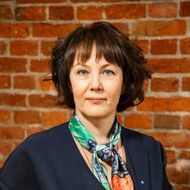The discussion confirmed that Russian business education is currently in a stage of active rethinking and growth. Business schools are moving toward new models that combine academic depth, technological advancement, and practical relevance, while corporate universities are becoming an integral part of this ecosystem, fostering the development of a new generation of management professionals.
New formats and strategies of business education in Russia

Experts from leading Russian business schools discussed how management models, educational formats, and business school development strategies are evolving in response to the challenges of the time.
The discussion was moderated by Dmitry Volkov, First Deputy Director of the HSE Graduate School of Business. Participants included Violetta Grigorieva, Executive Director for Academic and International Relations at the Moscow School of Management SKOLKOVO; Natalia Evtikhieva, Deputy Director of the Institute of Public Administration and Management of RANEPA, General Director of RABE and NASDOBR; Aigul Kadyrbaeva, Deputy Director of the Graduate School of Management, St. Petersburg State University; Vladimir Koptsev, Director of MBA Programs at the HSE Graduate School of Business; and Fyodor Fyodorov, Executive Director of the MIRBIS School of Business.
Opening the discussion, Dmitry Volkov outlined the global context of business education development and emphasized that today, the global market for business schools is moving beyond the traditional Anglo-Saxon model and becoming truly multipolar.
Reflecting on strategic directions for development, the expert suggested viewing business schools through the lens of four models: the craft model, the university model, the “learning machine” model, and the technological platform model. According to Dmitry Volkov, hybrid solutions now prevail, combining academic depth with practical relevance and the flexibility of market-oriented approaches. He also noted that the key drivers of development are the integration of engineering, digital, and management knowledge, as well as the cultivation of analytical and research thinking among students.

First Deputy Director, HSE Graduate School of Business
Sometimes business education is called skills-based, and perhaps for some programs this is true. But under current conditions, it’s no longer just about skills. Today, business education is about developing new abilities — creativity, systems thinking, and problem-solving. It’s no longer about simply “knowing how to do,” but about knowing how to think, connect different fields of knowledge, and drive innovation.
These ideas set the tone for the discussion: participants talked about how Russian business schools are shaping their strategies in the new environment and how they combine international experience with national specifics. Experts agreed that interdisciplinarity and the ability to foster strategic thinking will be decisive factors for business school competitiveness in the coming years.
At the end of the meeting, Natalia Shumkova, Deputy Director of the HSE Graduate School of Business for Corporate Education, presented the results of the new wave of the study “Corporate Universities in Russia — 2025.” The aim of the research is to systematize knowledge about corporate universities in the Russian context.

Deputy Director, HSE Graduate School of Business for Corporate Education
Over the four years of our research, 75 corporate universities (CUs) have participated, and the number of respondents has grown from 40 in 2022 to 62 in 2025. A stable core of 25 CUs has been formed, all of which have taken part in all four waves of the study. This year, the project was implemented with the financial support of the TMH Corporate University. We have significantly updated several sections of the study, including those related to the role and position of CUs in the management systems of parent companies, CU teams and organizational design, the management of learning method portfolios, and cooperation with universities and business schools. New sections were added on digital technologies, in-house research, and personnel assessment. The full results of the fourth wave of the project will be presented soon.
